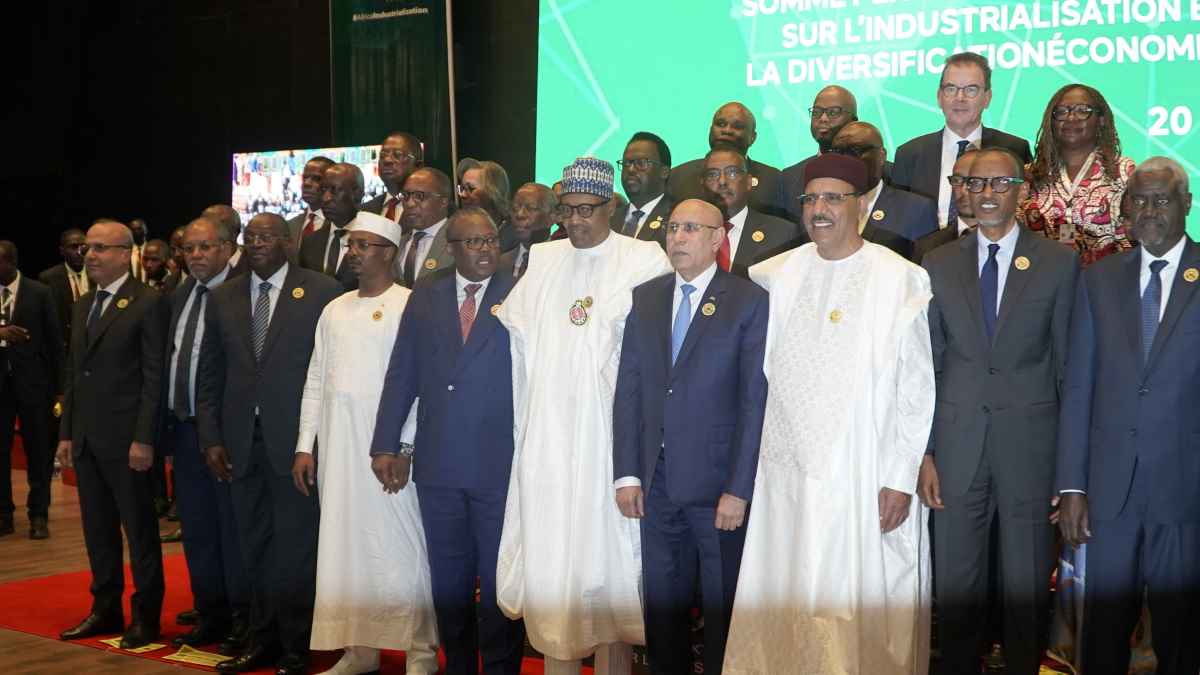Bazoum called on African countries to entrench the rule of law to catalyze the emergence of the African private sector
NIAMEY, Niger, December 1, 2022/APO Group/ —
African leaders reviewed the continent’s progress in industrialization, economic diversification, and the African Continental Free Trade Area (AfCFTA) in the context of global shocks, debt vulnerabilities, climate change, and security concerns.
Twenty heads of state and government as well as their representatives attended the African Union Extraordinary Summit on Industrialization, Economic Diversification, and the AfCFTA in Niamey.
“Not so long ago, the juxtaposition of the words industrialization and Africa might have seemed incongruous. Today, the question it raises is mainly one of ways and means,” said Nigerien President Mohamed Bazoum, the summit’s host. “This in itself is proof that we are on the right track. A Nigerien proverb says, ” You cannot stop a river,” he added.
Bazoum called on African countries to entrench the rule of law to catalyze the emergence of the African private sector, unleash the energies of African entrepreneurs, and simplify the business environment.
“Inclusive, coherent, and sequenced industrialization that we want cannot be imposed and can only be achieved by creating synergies between the private and public sectors to empower small and medium sized enterprises and create quality jobs. .”
Bazoum added: “the youthfulness of the population and its growth, which are a challenge, can constitute an asset, provided the demographic transition is well-managed.”
His Nigerian counterpart, President Muhammadu Buhari. echoed the sentiment. He said, “The African continent is blessed with a large youth population that can meet our labor shortages. Therefore, we need to tap into this abundant human resource by providing our youth with quality education that is relevant to their goals and meets the requirements of the labor market.”
For President Paul Kagame of Rwanda, the way forward on industrialization entails investment in energy and infrastructure.
We need to invest more of our national budgets in industrial policy, and significantly increase energy and infrastructure capacity
“The pace of industrialization in Africa is still too slow to achieve Africa’s development goals under Agenda 2063,” said Kagame. “We need to invest more of our national budgets in industrial policy, and significantly increase energy and infrastructure capacity.”
In a speech read on his behalf, African Development Bank President Akinwumi Adesina noted that free trade areas had brought prosperity worldwide not by trading low-value products, but by industrial production. “It is, therefore, clear that Africa’s prosperity must no longer depend on exports of raw materials but on value-added finished products,” he said. Marie-Laure Akin-Olugbade, African Development Bank acting vice president for Regional Development, Integration and Service Delivery, represented Dr. Adesina and delivered the speech on his behalf.
“Across Africa, we need to turn cocoa beans into chocolate, cotton into textiles and garments, coffee beans into brewed coffee,” Adesina said. He said the Bank was investing $25 billion to transform the continent’s agricultural sector and unlock the agribusiness market, which is expected to reach $1 trillion in value by 2030.
The Bank chief also detailed efforts to develop spheres that will boost Africa’s industrialization and economic diversification, including the energy, health, natural resources, and pharmaceutical sectors.
“Africa has an abundance of natural resources, oil, gas, minerals and metals, as well as a vast blue economy that needs to be rapidly industrialized,” Adesina said. “The future of electric cars in the world depends on Africa, given its vast deposits of rare mineral resources, including lithium-ion, cobalt, nickel and copper. The size of the electric vehicle market has been estimated at $7 trillion by 2030 and $46 trillion by 2050. Building precursor facilities for lithium-ion batteries in Africa will cost three times less than in other parts of the world,” he said.
During the summit, the African Development Bank, the African Union, and the United Nations Industrial Development Organization launched (https://bit.ly/3Ul8mBC) the inaugural Africa Industrial Index. The joint report showed that 37 out of 52 African countries have industrialized over the past 11 years. The study provides a country-level assessment of the progress made by the 52 African countries based on 19 key indicators.
The 19 indicators in the index cover manufacturing performance, capital, labor, business environment, infrastructure, and macroeconomic stability. The index also ranks the level of industrialization of African countries along various dimensions such as capital, labor endowments, , institutions, infrastructure, and macroeconomic stability, amongst others.
South Africa has maintained a very high ranking throughout the 2010-2021 period, followed closely by Morocco, which is in second place in 2022. Egypt, Tunisia, Mauritius and Eswatini complete the top six over the period.
The report will help African governments to identify benchmark countries to better assess their own industrial performance and adopt best practices more effectively.
During the summit, heads of state also reviewed the pace of operationalization of the African Continental Free Trade Area, which came into force in January 2021 as well as its linkages to industrialization.
Distributed by APO Group on behalf of African Development Bank Group (AfDB).
